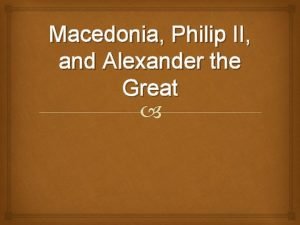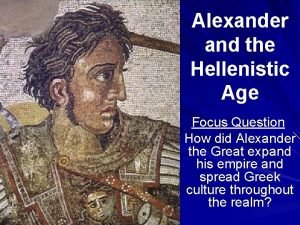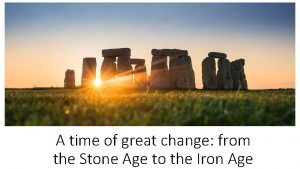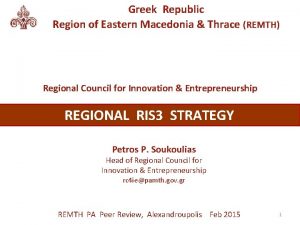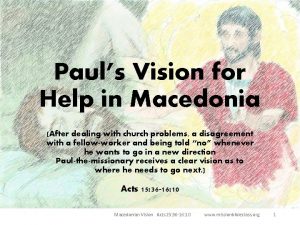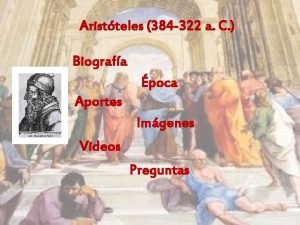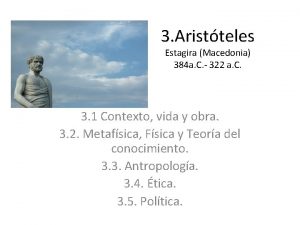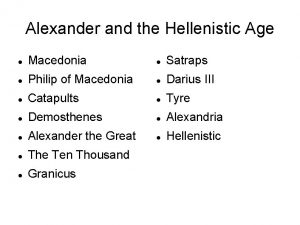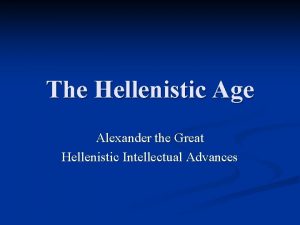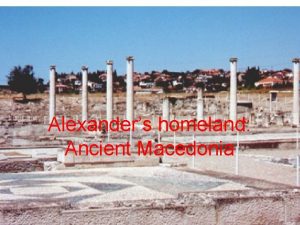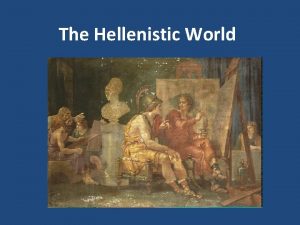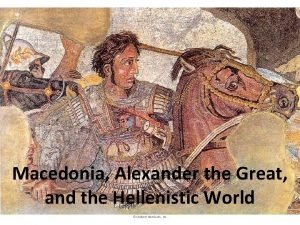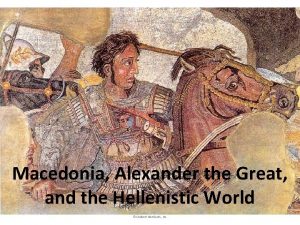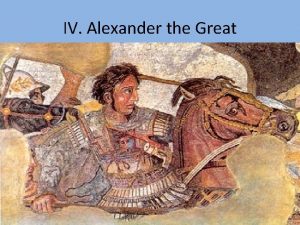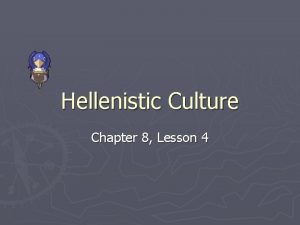Alexander and the Hellenistic Age Macedonia and Philip

















- Slides: 17

Alexander and the Hellenistic Age

Macedonia and Philip II • Rugged land to the north of the Greek city-states • Ruled and inhabited by people of Greek origin and who kept ties to Greece • Philip II ruled Macedonia starting in 359 BC – Built a powerful army – Allied himself with some city-states – Conquered some city-states – Eventually defeated Athens and controlled all of Greece – Wanted to conquer and rule Persia, too, but was assassinated and his son Alexander took over



Alexander the Great • Though Alexander was only 20, he was an experienced soldier, well-educated, and was ready to try to take Persia by 334 BC • Persia wasn’t as strong as it had been and Alexander never lost a battle – He captured and controlled most of the Persian empire – His soldiers were tired and wanted to go home, so Alexander eventually agreed to go back (to Babylon) for a bit – Alexander died (of a fever) before he could go out again – 3 generals divided up the empire and their descendants battled for control of the land for 300 years











The Legacy of Alexander • As Alexander’s army conquered and his empire spread, Greek culture was spread from Egypt to India • Alexander adopted many Persian customs and encouraged others to do the same, which resulted in a great blending of Greek, Persian, Egyptian, and Indian culture = Hellenistic • Capital of Hellenistic culture: Alexandria, Egypt – Lots of trade in this city – Built a great museum and library to serve as a center of learning

Hellenistic Age • Women – – no longer restricted to home Some could read and write Some became philosophers or poets Royal women held power and worked alongside ruling husbands; in Egypt, Cleopatra held her own power • New Ideas – Golden Age of Greek drama (plays) was during this time – Stoicism: avoid desires; calmly accept what life brings; protect the rights of fellow humans; all are morally equal because all have the power of reason; influenced Roman and Christian thinkers – Pythagoras and Euclid developed their mathematical formulas – Aristarchus (astronomer) figured out that the earth revolved around the sun, though the idea was not accepted for almost 2, 000 years – Archimedes used principles of physics to master the use of the pulley and lever – Hippocrates studied illnesses and looked for cures (Hippocratic oath is named after him)
 Macedonia under philip ii
Macedonia under philip ii Philip macedonia
Philip macedonia Lesson 5 alexander and the hellenistic era
Lesson 5 alexander and the hellenistic era Definition of hellenistic culture
Definition of hellenistic culture Astronomer in the hellenistic age
Astronomer in the hellenistic age Stone age chronology
Stone age chronology Iron age bronze age stone age timeline
Iron age bronze age stone age timeline Troas macedonia
Troas macedonia Creative tourism eastern macedonia and thrace
Creative tourism eastern macedonia and thrace Sustainable tourism eastern macedonia and thrace
Sustainable tourism eastern macedonia and thrace Paul macedonia
Paul macedonia Paul macedonia
Paul macedonia Paul vision macedonia
Paul vision macedonia Macedonia carlo magno
Macedonia carlo magno Uom library
Uom library Nació en macedonia en el 384 a. c.
Nació en macedonia en el 384 a. c. Pausanias macedonia
Pausanias macedonia Estagira macedonia
Estagira macedonia

